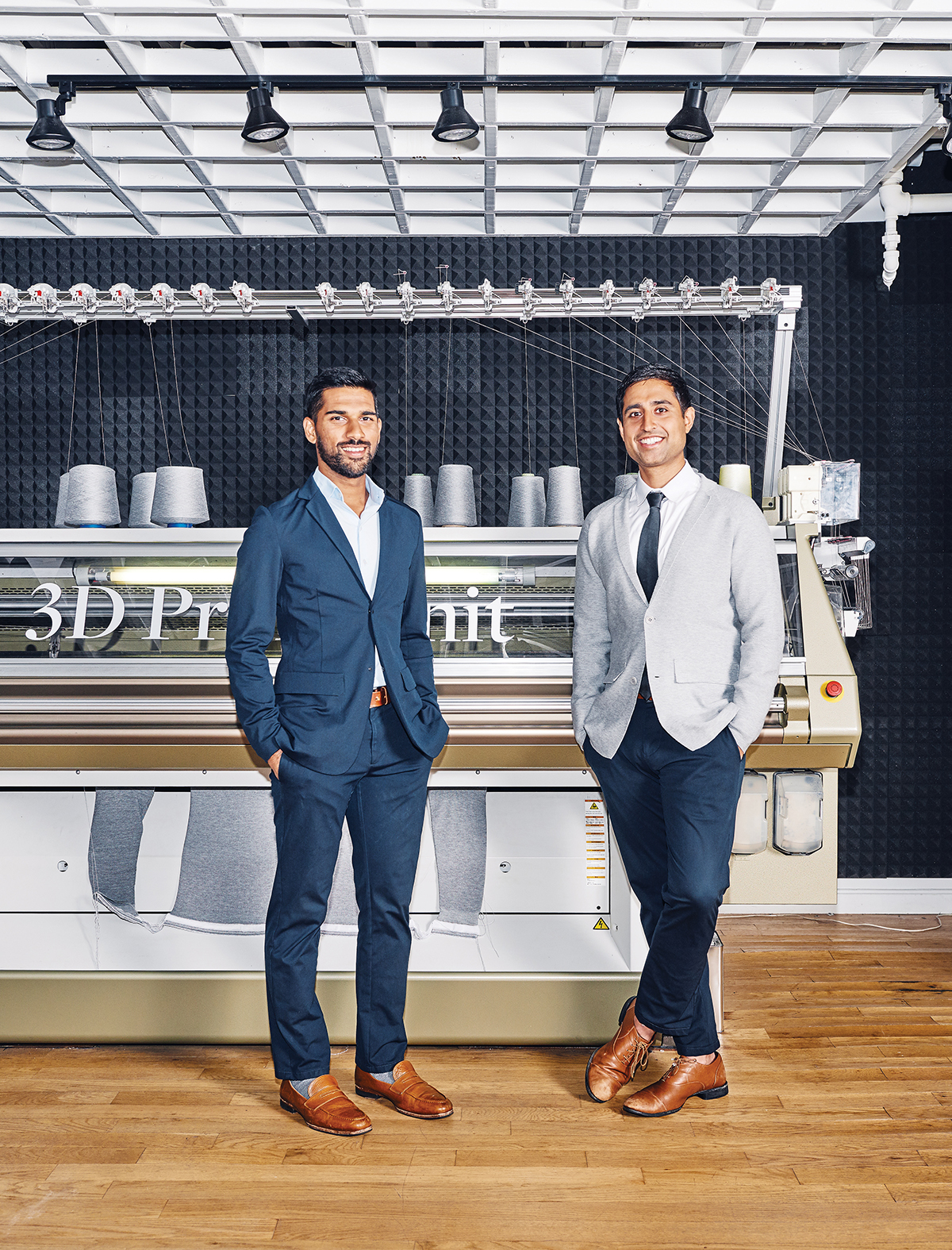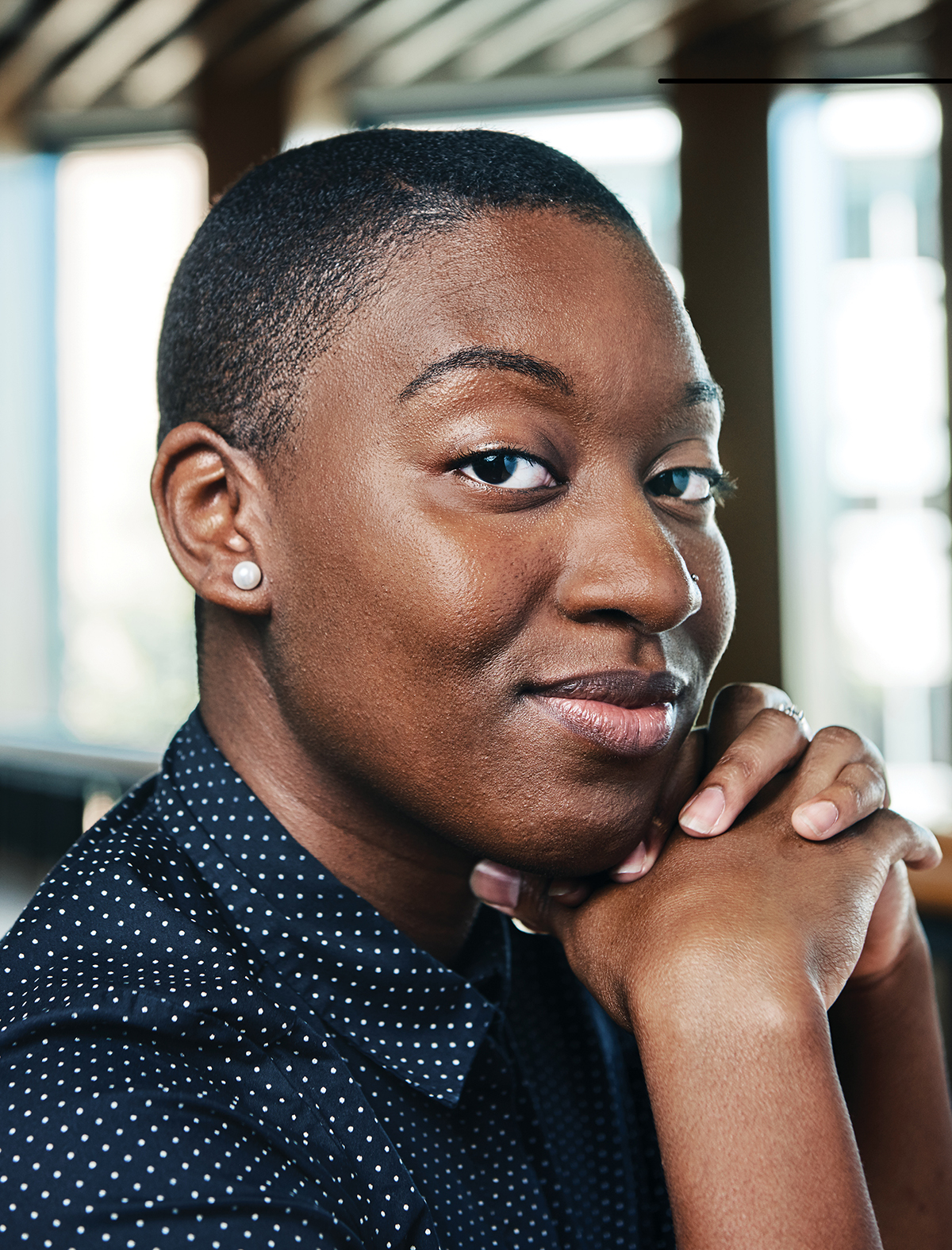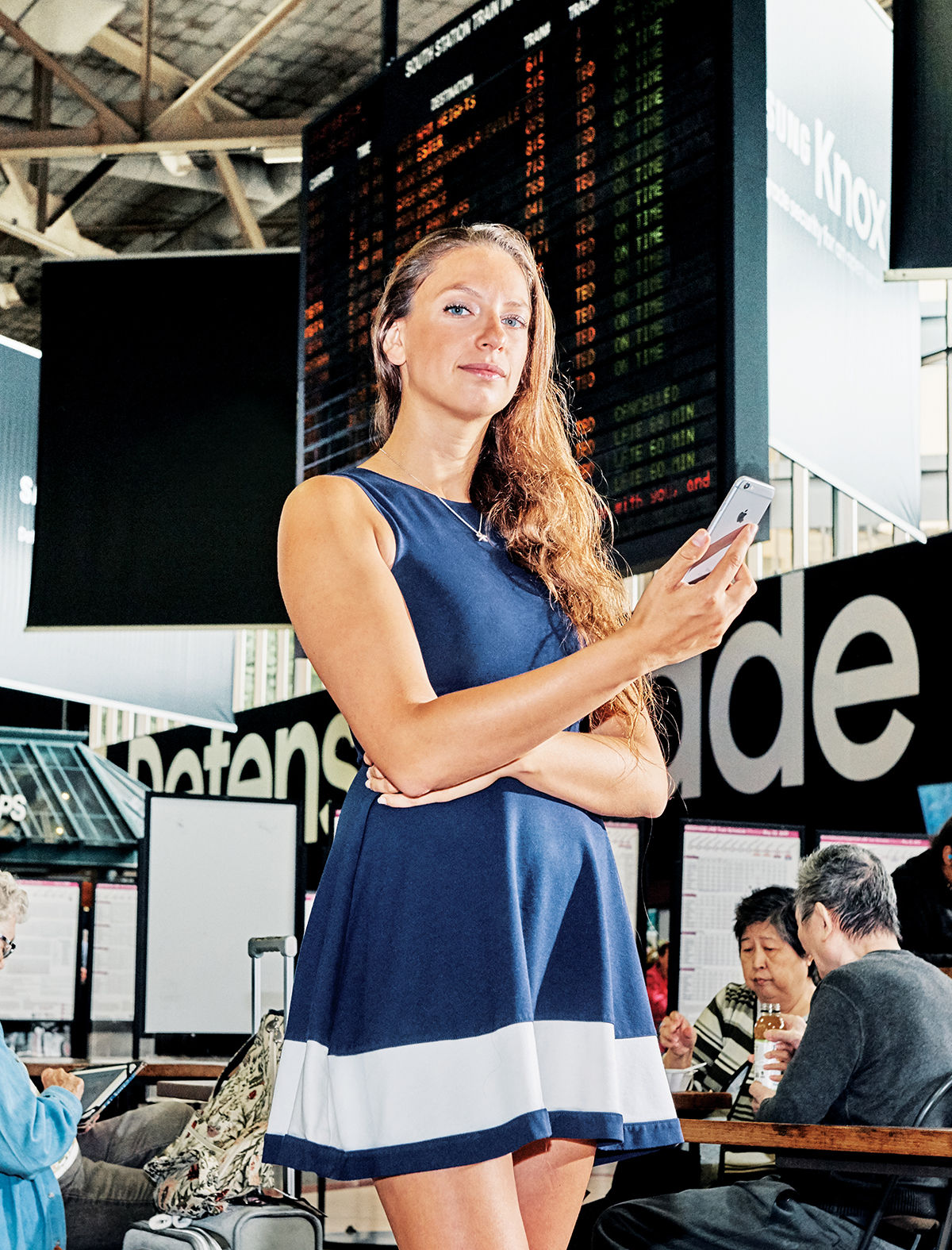Bright Young Things

Illustration by Peter Crowther
~ The Pioneers ~
Natalya Bailey
31, Accion Systems
“If humans are going to be around in hundreds of years, it’s going to be because we were able to become an interplanetary species,” Natalya Bailey says. If that happens, chances are Bailey will have played a role: Missions to Mars and beyond may one day get a boost from her Boston startup Accion Systems, an MIT offshoot commercializing a new type of propulsion system that could make space travel much faster. First, though, Accion plans to focus on the company’s cash cow: shrinking satellites to roughly the size of a shoebox and making them more affordable. The business expects to deliver its first satellite system for launch in early 2018. With it, CEO Bailey and her cofounder, Louis Perna, hope to play a key role in the “democratization of space.”
Seth Priebatsch
28, LevelUp
Nearly a decade has gone by since Seth Priebatsch founded his Boston-based company, making him a seasoned tech veteran who’s still a couple years shy of 30. “Save for one internship after high school, this is the only job I’ve ever had,” he says of running his trailblazing mobile-payments app. The company started as Scvngr, a game he dropped out of Princeton to launch, but morphed into LevelUp years before Apple Pay hit the market. The difference between the two is Priebatsch’s focus on helping users save money while helping restaurants make more of it, by driving customer loyalty and securing lower credit-card processing rates. The company itself leveled up recently, receiving $50 million in funding to bake its technology into other programs.
Janet Comenos
31, Spotted Media
Consumer brands have long wanted the ability to advertise using paparazzi photos of stars using their products, but pesky product endorsement rules always got in the way. Enter Janet Comenos. After six months of research, she devised a legal way no one else had thought of—companies can make a factual statement that a VIP is wearing their merchandise, and get the celebrity’s agreement to advertise that fact—then launched Spotted Media to broker the permissions, payments, and ad placements. So far the business, which boasts direct relationships with 1,000-plus celebrities, has served ads to more than 100 million consumers. “In terms of the entertainment space, I didn’t have any experience,” says Comenos, who previously ran sales for a marketing tech startup. But “it’s easier as an outsider to analyze the situation.”
Gabe Blanchet
26, Grove
It was only a matter of time before tech came for the simple, earthly pleasure of your home garden. Grove, a startup CEO Gabe Blanchet launched as an MIT undergrad with fellow student Jamie Byron, has pioneered furniture-like appliances (complete with an app) for sprouting produce indoors without making your home a tangled hydroponic jungle. After a successful Kickstarter campaign, Grove is now partnering with major retailers that want to offer their own growing systems. Look for the first to hit the market next year.

Portrait by Tony Luong
Aman Advani & Gihan Amarasiriwardena
32 (Advani) and 29 (Amarasiriwardena), Ministry of Supply
In a city not exactly known for its fashion industry, Ministry of Supply is reinventing what people wear to work. But MIT alums Aman Advani (pictured at right) and Gihan Amarasiriwardena say the company’s “performance professional” clothing—which uses technology derived from NASA to eliminate moisture and manage heat levels—is just the first part of their vision. With retail spots in eight cities, including a Newbury Street flagship, the company is now boldly exploring the next frontier of shopping: 3-D printing of garments right in the store. The approach could represent the “future of retail,” Advani says—where “you show up to the store, and there’s no inventory on hand, just three or four machines. And once you’ve clicked ‘print,’ a few minutes later you have a garment.”
~ The Connectors ~

Portrait by Tony Luong
Kristen Ransom
26, IncluDe
If there’s one thing Kristen Ransom is out to prove, it’s that growing a top-notch Web-design business and making tech more inclusive can go hand in hand. Employing a team of developers composed of many stay-at-home parents, her Dorchester company, IncluDe, has churned out sleek designs for more than 40 sites since it launched two years ago, with a focus on providing services to female- and minority-owned businesses at affordable rates. Web development is just phase one of her ambitions for IncluDe, though; phase two is creating actual software products. Under development now, the first is a tool for building websites that better meet the needs of visually impaired audiences. “We’re trying to change the face of tech,” Ransom says, “and make it so everyone’s included.”
Melissa James
28, the Tech Connection
Many tech companies are interested in hiring diverse talent—they’re just not great at actually doing it. That was the takeaway for Melissa James from her time working at Google, which she left in 2014 to tackle the issue of diversity in tech head-on by founding the Tech Connection. The Boston company goes beyond the work of a typical recruiting firm by consulting with tech firms on the particulars of hiring underrepresented software engineers, then “setting candidates up for success” by providing coaching before the job interview and help for the first few months after they’re hired, says James, whose client list includes Google, Microsoft, and HubSpot. As workforce demographics continue to shift, James explains, seeking out diverse talent “is not just a PR thing. This is a strategic business imperative that we need to focus on right now.”
Liz Powers
29, ArtLifting
After getting a grant from Harvard to start an art group at a local homeless shelter, Liz Powers came away convinced that much of the participants’ work wasn’t just good—it was good enough to sell. What was missing was a marketplace. So in 2013 she and her brother, Spencer, founded ArtLifting, an online store that has since grown to represent 130 artists across 19 states who are either homeless or have disabilities. Participants receive not just an income, but a confidence boost as well, Powers says: “It’s pretty overwhelming to hear things like, ‘I felt invisible, but now I know people care about me.’” While consumer purchases continue, the company has seen its biggest growth in sales to corporate customers—there are now more than 100—as well as licensing: ArtLifting pieces appeared on Starbucks gift cards last year.
Sarah Downey
32, Accomplice
Helping to make women a greater force in the Boston tech community is a thread that runs through much of Sarah Downey’s work. One of the next-gen principals at Accomplice—the prolific Cambridge VC firm—she’s also bringing women in the tech scene together as a cofounder of Rev Boston, an annual event that fosters connections among a select group of women at the VP level—not yet CEOs, but on that trajectory. “They’ve formed relationships and done things far and above what we ever hoped for,” Downey says. “It’s taken on a life of its own.”
Eddy Zhong
20, Leangap
Founding a startup and selling it to a corporation while still in high school is rare even in the age of young tech prodigies. But Eddy Zhong, who did just that with his wearable-device company, Blanc Watches, doesn’t think it should be so unusual. After closing the deal on Blanc, he dropped out of high school to launch Leangap, a pioneering startup incubator for high school students, in Boston. There, participants are expected to create an actual product and possibly even raise investment funding by the end of the five-week program. Zhong says he’s “passionate about helping other high school students do the same thing” that he accomplished, and it seems plenty of teens would relish the opportunity: This past summer’s Leangap session received 1,000-plus applications for the 40 available slots. Zhong is now expanding the program to a second location in San Francisco, as well as licensing Leangap’s curriculum to a Beijing incubator.
Elizabeth Dobrska
28, TUGG
Keeping Boston’s tech industry plugged into the wider community is top priority for Elizabeth Dobrska, who this summer was promoted to executive director at Technology Underwriting Greater Good (TUGG), a nonprofit that puts on popular events to raise awareness and money for local social entrepreneurs. TUGG-backed organizations have included Inner City Weightlifting, which helps ex-gang members become personal trainers, while other activities include organizing massive volunteer days to benefit the local community. It’s a model that’s gotten the attention of tech folks in other cities—TUGG is currently working on putting together a blueprint for expansion—“but right now, no one else does what we do,” Dobrska says.
~ The Dealmakers ~
Krishna Gupta & Neil Chheda
30 (Gupta) and 31 (Chheda), Romulus Capital
When Krishna Gupta started Romulus Capital in his MIT dorm room in 2008, “venture was a middle-aged white man’s game,” he says. In many ways, it still is—with Romulus being a notable exception. “We look a little bit more like the next generation of entrepreneurs,” says Gupta of himself and partner Neil Chheda, both of whom are Indian American. And they act more like young entrepreneurs, too, bringing a hands-on energy to the traditionally staid VC world and working with startups on everything from hiring to landing customers. That drive enabled the Boston firm to win competitive deals such as EquipmentShare, an Airbnb-like equipment-rental service that started in a midwestern city other investors were less willing to visit. “It was a matter of hustle,” Chheda says. While Romulus has raised almost $200 million and will back startups anywhere, Boston is a central focus, with key local investments such as real estate software firm Placester and behavioral analytics firm Cogito. The VC, Gupta says, is “rooted in the idea that we wanted to help create more large companies coming out of the Boston ecosystem.”
Wayne Chang
34, Angel Investor
“I’m not a father,” says Wayne Chang, “but I’m guessing this is what a proud dad would feel like.” Chang has plenty of reason to boast about his digital progeny: His software, which reveals the reason an app crashes, is embedded in more than 1 million apps—and thus on nearly every iPhone and Android phone out there. After Twitter bought his Cambridge-based startup, Crashlytics, in a deal valued at more than $100 million, Chang joined the media giant to help lead its first office in the Boston area. He went back out on his own earlier this year after his unit sold to Google, and since then has been bolstering his rep as one of Boston’s most prolific angel investors, with 55 startups under his wing so far. Whether any of these projects takes the place of Chang’s favorite child, we’ll have to wait and see.

Portrait by Tony Luong
Peter Boyce & Natalie Bartlett
27 (Boyce) and 26 (Bartlett), Rough Draft Ventures
The founding of a little company called Facebook on Harvard’s campus laid bare the incredible entrepreneurial potential at local schools. But it wasn’t until another Harvard student, Peter Boyce (pictured at right), cofounded Rough Draft Ventures in 2012 that Boston got a formal VC network for its student-hatched startups. Harvard Business School researcher Natalie Bartlett joined Boyce not far into the effort, and now both hold investor positions with General Catalyst Partners, the Cambridge VC firm that funds Rough Draft’s investments. Along with providing early support and investment to student businesses—more than 90 have been funded so far—Rough Draft also operates with a team of students who evaluate investments and come away with startup-world experience. The company is all about “inspiring students who may not have wanted to take a risk” to pursue their idea, says Bartlett, the director of marketing and portfolio. Take, for example, Mark43, which Rough Draft backed in its formative days: A maker of software for police departments, it now employs more than 100. When asked what he’s most proud of, Boyce—who splits his time between Boston and New York, where the business expanded to last fall—puts it this way: “There is something insanely special…about being the first ‘yes’ and the first supporter of someone.”
~ The Disruptors ~

Portrait by Tony Luong
Nick Rellas
27, Drizly
Here’s how most of us buy alcohol: You walk into your neighborhood liquor store, hope it has the tequila brand you want, and pick up your second or third choice if it’s not on shelves. It doesn’t have to be that way—at least not according to Nick Rellas, cofounder and CEO of the startup Drizly. Headquartered in the Back Bay, his company has expanded from its roots as a booze-delivery app to become an e-commerce marketplace that lets customers compare what local stores have on hand, then order a choice bottle of wine or whiskey to be picked up or delivered to their front door in less than an hour in most locations. The concept has been a smash(ed) success in today’s convenience economy, covering about 150 million tipplers across 40 markets in the U.S. and Canada. And Rellas will drink to that.
Rob Biederman & Patrick Petitti
31 (Biederman) and 33 (Petitti), Catalant
As millennials continue to conquer the labor force, the future of work will look starkly different. Rob Biederman and Patrick Petitti believe it should happen when and where the talent wants it to—and they’re trying to make that future happen today. That’s why they’ve created an on-demand online marketplace that connects more than 40,000 specialists with companies in need of their services. “People should be able to live their lives and fit work in, and that’s what we’re making possible,” Petitti says. In the beginning, Catalant focused exclusively on connecting customers to freelance business consultants, but has since added software for companies to manage all of their internal talent. The concept, now embraced by nearly a quarter of Fortune 100 companies, is expected to generate $50 million in revenue this year. Aside from an early investment by billionaire Mark Cuban, all of the firm’s backers are in and around the Hub (Silicon Valley investors didn’t like that the founding team lacked technical prowess). But success has come because of something you don’t necessarily get with a computer science degree, Biederman says: a “completely manic” devotion to pulling it off.
Zoë Barry
32, ZappRx
Zoë Barry knows firsthand how the complexities of the healthcare system can get in the way of healing patients. After her brother was diagnosed with severe epilepsy at age five, he had to wait a whopping nine months to receive his prescriptions, during which time his condition worsened. Two years later, Barry founded a software company, ZappRx, to help remove the inefficiencies involved with the prescription of specialty drugs. The approach, which digitizes and speeds up communication between healthcare providers, is catching on: Major providers including Tufts Medical Center have adopted the technology, and Boston-based ZappRx recently raised $25 million to hire a nationwide sales force. Barry says she faced initial resistance due to her age, joking that the healthcare system suffers from “OMDS”—“old male doctor syndrome.” The solution? Bringing a doctor along to her meetings. “I wasn’t going to wait 40 years to found the app, so we figured out ways to solve the initial reservations people had,” Barry explains.
TJ Parker & Elliot Cohen
31 (Parker) and 34 (Cohen), PillPack
Perhaps the most surprising thing about PillPack, a consumer-friendly online pharmacy founded by TJ Parker and Elliott Cohen, is that no one had thought of it before. The Somerville-based company’s individualized “PillPacks,” which contain all the medications a person needs each day, are shipped directly to users as needed, taking much of the work (and error) out of keeping up with crucial prescriptions. “No one has offered what we consider to be modern e-commerce and pharmacy,” Parker says. The startup was nearly cut off from access to one-third of its customers last year, when it entered into a contract dispute with pharmacy benefits company Express Scripts. But the businesses quickly made amends after Parker drew public attention to the situation, and PillPack’s growth has surged since, highlighted by more than $100 million in revenue expected this year. The bottom line, Parker says, is that the company is “starting to have a tangible impact on customers’ lives.”
Le Zhang
28, Squadle
Le Zhang launched his tech career while still in high school, landing his first software development job at State Street at the ripe old age of 16. “I got to figure out how these big corporations operate,” he says, “but they were way too slow for the kinds of things I wanted to work on.” Fittingly, Zhang’s Kendall Square startup, Squadle, is all about capitalizing on the corporate world’s reluctance to adopt change, offering sensors and automation to digitize operations for two of the last industries that still rely on paper records: retail and restaurants. Customers so far include Dunkin’ Donuts, Sonic, and Chick-fil-A, and that’s just the beginning, Zhang says: “In five years, I can see every multi-unit retail store using our system.”
~ The Visionaries ~
Giuseppe Stuto
27, Fam
With Fam, an app that offers easy, free group video calls on your smartphone, CEO and cofounder Giuseppe Stuto is hoping to show that a Boston social networking startup can succeed without relocating to Silicon Valley. The app got off to a viral start after launching in December, with 1 million users joining in the first two weeks; the community has since grown to nearly 5 million. The secret to Fam’s success? Its integration with the iPhone, which allows users to launch group video chats through iMessage or FaceTime—a feature that Apple doesn’t offer, but one that resonates with teens, Fam’s most loyal users. As for the decision to remain in Boston rather than follow the Facebook approach of moving west? “We stand out here,” Stuto says.
Olivia Joslin & Hannah Wei
21 (Joslin & Wei), CliqBit
They haven’t even graduated from Wellesley College yet, but Olivia Joslin and Hannah Wei have already been through a lot as startup founders. As sophomores, they launched a social media app, CliqBit, focused on sharing funny moments and content with friends. The app proved popular enough that investors were ready to hand them $1.5 million in funding—until the pair realized they’d be unlikely to compete with Snapchat down the road on features such as augmented reality. So they did the unthinkable for first-time entrepreneurs: They turned down the money. What they didn’t do was give up on running a startup together. While working on CliqBit they’d learned that teens, their core audience, are difficult for market researchers to find. And so CliqBit was reborn as a company focused on engaging young people for participation in market research surveys. In turning down the investor funding and shifting to something larger, Joslin and Wei “were just demonstrating founder maturity that normally you don’t see from people until their second or third startup,” says David Chang, a Boston entrepreneur and investor who heads the Babson Summer Venture Program, which CliqBit took part in this year. Their new business “has a much bigger opportunity behind it.”
Rick Fredkin
35, Eduporium
Growing up, Rick Fredkin taught himself the art of programming by playing with computers—and developed such a knack for it that he was teaching coding before his 15th birthday. Seeing what young people can do when given the right tech inspired him to start Eduporium, which provides programmable robots, 3-D printers, and more to school systems at a discounted rate. Eduporium stands out because of its focus on “productive technology” for students, Fredkin explains—that is, technology you can learn marketable skills from, as opposed to just consume content on. The Watertown company is currently working with schools from Maine to Pennsylvania, with an expansion to states such as California and Florida coming soon. “The ultimate goal is to be the major brand name in technology to education,” says Fredkin, the cofounder and CEO. “The future is ‘technology literate.’ This is going to be the way of the world.”

Portrait by Tony Luong
Polina Raygorodskaya
31, Wanderu
Having grown up on computers and tablets, young people “have very little patience for bad technology,” says Polina Raygorodskaya—especially when it comes to planning leisure time. Looking to streamline the process, the former PR exec launched Wanderu, a millennial-focused travel company that offers fast, easy digital booking for bus and train tickets—think of it as the Kayak of ground travel. What wasn’t easy at first was convincing transportation companies to participate. “Telling them, ‘You’re doing things wrong,’ you don’t really get a lot of people who want to listen,” says Raygorodskaya, the company’s cofounder and CEO. A turning point was finding an advocate on the board of the American Bus Association—a board that Raygorodskaya currently sits on. Now the Boston company works with the likes of Amtrak and Greyhound and serves more than 4 million users a month in North America and Europe.

